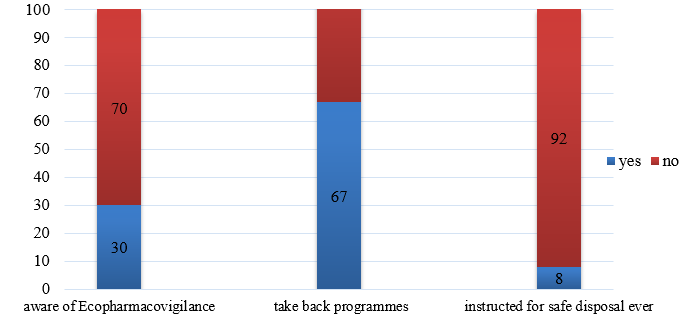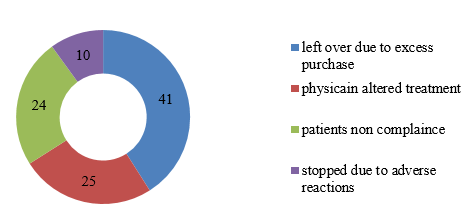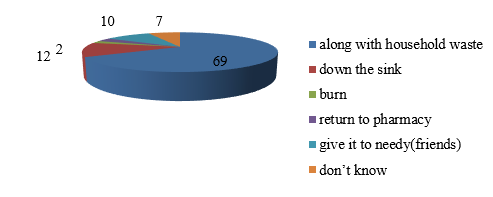Introduction
Medications are essential part of one’s lifestyle and left over medicines are commonly found at every home. The reasons of accumulation of left over and expired medicines can be discontinuation of therapy, start of new medicine or expiry of medicines. As per the literature reports these stocked medicines are disposed by improper methods leading to environmental hazard.1 The presence of pharmaceuticals and their products in environment are potentially hazardous. Their accumulation in water contributes to increased antibiotic resistance or exposure of population to drugs including aquatic animals.2 In addition personal care products, pesticides used in fields also enter the surface water, ground water leading to entry in to food chain. Disposal of accumulated drugs (unused, partially used, unneeded or expired) by both hospitals and patients maximize the introduction of active pharmaceutical ingredients (APIs) to the environment by dodging natural physiological processes that might have reduced their amounts via excretion.3This disturbs the whole ecosystem e.g. indirect exposure to diclofenac lead to substantial decline in number of vultures in Indian subcontinent and inculcation of the same . NSAID (Non steroidal anti-inflammatory drug) in treatment of livestock and consumption of their dead bodies by vultures led to their kidney failures and consequently they were declared as endangered species.4Various Government and non Governmental organizations became active to save these most efficient scavengers of nature. In effort to improve the natures balance Government of India also banned diclofenac in India for veterinary use.5 But the solution for this problem is not only banning a single medicine but to look out for all the causes leading to entry of chemicals in ecosystem. Medicine disposal habits are influenced by environmental awareness, availability of official state guidelines, dosage form, social and cultural attitudes. Sink, toilet and rubbish bins are the most commonly used but environmentally unfriendly routes of drug disposal. A huge pileup of expired and unused medications in the medicine cabinets among public reflects ignorance regarding disposal techniques and how drugs affect the environmental health.6 Although FDA has issued certain guidelines for proper disposal but still in India people are not that much aware.7
Assessing and improving Knowledge, Attitude and Practice towards disposal of unused medicines is the need of the hour. This serves as an important measure for the policy makers and concerned environmental regulatory bodies for development of formalized protocol for accurate and safe drug disposal guidelines along with destruction of expired drugs and also a driving force to control the drug wastage.
Materials and Methods
This cross sectional, descriptive study was conducted on medical graduate, post graduate and nursing students of tertiary care hospital of North India post ethical committee permission vide letter no.GGS/IEC/17/18.
Study Tool
Self administered, semi structured, validated Questionnaire consisting of 30 open and close ended questions covering the various domains i.e Knowledge, attitude and practice about the disposal of left over medications was used. Those participants who consented to participate were included. Data is presented in the form of counts and cents. Time given was thirty minutes to fill the questionnaire. The purpose of the study was explained to the participants and their confidentiality was ensured.
Results
A total of 417 students were given the questionnaire. Demographic data included 58% males, 42% females. Awareness to the concept of eco-pharmacovigilance (EPV) was not very much evident (70%) as only 30% could correctly answer what is ecopharmacovigilance. (Fig 1) The fact that drugs appear in human excreta was known to majority (85%) but surprisingly not much students knew the fact that it could be a threat to environment. The proportion of students who were instructed by physicians/pharmacies or senior nursing staff regarding the proper disposal of the drugs was negligible (8%) (Figure 1).
Further quantitative analysis revealed that the common way of procuring medicine was purchased on prescription (72%) and the most common drug procured in our study group was NSAIDS (55.9%) followed by antibiotic (53.9%) and antacids (specifically PPI). Exam/tutorial pressure was cited main reasons for frequent analgesic intake by students. Antineoplastics (72%) followed by Analgesics (4.31%) and Antibiotics (19.4%) were categorised as most dangerous class of drugs by our study participants posing maximum threat. Poisoning cases due to unused medicines were not seen/ reported by majority (95%). Checking the expiry date of medicines before procuring was a regular practise followed by 95.6% of students.
Stockpiling was common and was reported by 100 % of students and the reasons documented behind the stockpiling of medicines are presented in Figure 2.
The most common method of medicines disposal was with the household rubbish(74.8%) whereas 8.6% throw it in toilet rubbish and 2.8% down the sink.(Figure 3)
Regarding return to pharmacy as a method of disposal two things were highlighted, first that it was not at all practised if medicine was expired second in case of medicines with long shelf life left return was attempted by 14% reason was incentive of money return.
Open ended question asking for suggestions and opinions regards the solution to environmental threat were answered as follows: Government interference (59%), boosting up of pharmacies take back programmes (67%), education at root levels i.e community itself by regular sensitization programmes. Development of some collecting system of unused medicine at every OPD/ward/pharmacies where the prescription is done can lead to greater catch of the problem.
Discussion
Poor knowledge and unsafe disposal practises are alarming in medical students of a tertiary care hospital and teaching institute and we can easily relate the grave situation prevailing with the common man. Some previous studied among health professionals, undergraduates students8and consumers/patients9 in Indian scenario have also mentioned a poor requisite knowledge and practice of safe methods of disposal are currently inadequate.
The most common way of procuring medicine was prescription (72%) which was in comparison to other study conducted in south India which showed 62% of the people used prescribed medicines. The most common medicines procured according to our study was NSAIDs which is in concordance with other study which cited a specific NSAID (Paracetamol) was the most frequently purchased medicine.6
Medications are not immortal. Drug expiration dates are meant to indicate the date at which the drug potency begins to diminish. It is legal requirement, that all pharmaceutical products must carry the date of manufacture and date of expiry on their label which is called life period or shelf life of drug. The expiry date of a pharmaceutical specifies the date that manufacturer guarantees the full potency and safety of a drug. Checking of expiry date is a practice to be implemented. In India the schedule P (Rule 96) drugs and cosmetics Act (1940) specifies the life period (mostly 1-5 yrs.) of drug and conditions of storage. Our study showed that 95.6% of the students check the expiry date regularly but what they actually understand about it, was not assessed like what happens to its efficacy or toxic effects. Similarly in a study from Haldwani medical college conducted on Doctors, nurses and Pharmacist regarding all the aspects of expired drugs showed that 53.33% subjects had knowledge that expiry date of drug indicate loss of efficacy and 33.33% knows it is actually the loss of potency and 6.06% believe that Drug become toxic after expiry date and 6.06% believe nothing happens.10
Storing of unused medicines at home is a common finding between majority of studies previously conducted showed that 90% of the people do store medicines11 this could put health risks to the house residents as for example by accident overdose intake or by consuming the damaged pharmaceutical ingredients like Fanconi’s syndrome by expired tetracycline.
Environmental pollution and health hazards are the consequences of improper disposal of medicines. The most common method of drug disposal is throwing it in to the trash or household rubbish. Nipa et al12compared studies from different regions and concluded that all over the world people preferred to throw unused drugs in dustbin rather than disposing them in a proper way. This relates to ecopharmacovigilance (EPV) which is defined as “the science and activities associated with the detection, evaluation, understanding, and prevention of adverse effects of pharmaceuticals in the environment.” 13EPV is a developing science, still very much in its infancy, and there is therefore room for further debate and research (implementing EPV). In our study only 30% of the participants were aware of the concept of EPV. A similar type of study to check knowledge, perception of EPV of pharmacy people is reported from China which documented the mean score for knowledge about EPV was 3.85 out of a total of 10. But of the 107 respondents, 45 (42%) stated that they had not participated in any EPV measure. In addition, none had received training on EPV, and only 25(23%) respondents had read the literature on EPV. This indicates a clear grim situation in neighbouring country also. 14 The younger generation of medical field MBBS students, nurses, Post graduate students should be well sensitised about this issue in their college days so that when they come out of the colleges to serve the society they should be able to spread the awareness among common people. This can be done by including a chapter in their curriculum.
Many drugs are released into the environment, which makes them pollutants, through industrial waste and sub-products, animal and human excretions, household garbage, etc. Our study showed that 85% of the students were aware of the fact that drugs appear in human excreta but surprisingly not much of the students knew that it could be a threat to environment whereas study by Srisha comparing the knowledge of MBBS and BDS students showed that only MBBS students (54%) were more aware than BDS.8 Another study was conducted to know the patients opinion towards disposal of unused medicines which showed 45% of the patients reported that they know about the bad effects of improper drug disposal and the effects mentioned were poison, pollution, drug abuse and overdose.15
Unsafe disposal system contaminates surface bodies and drinking water and contributes to development of antibiotics resistance, or exposure of populations to irritant or mutagenic anticancer drugs and the possible link between endocrine disrupting compounds and failing fertility.16
The most sad part was the fact that only 8% of the students ever received instructions on drug disposal. The data was almost similar in case of study conducted by Nagarjuna17 which showed only 27.4% of MBBS doctors and 19.3% of BDS doctors and 30.9% of the nurses have ever received lectures on disposal of medicines which shows that when the persons responsible for spreading awareness are themselves not well conversed with the topic. The reason can be that this topic is not included in any books. A study was conducted in 2015 which included 14 Govt. universities and 30 private deemed universities which showed that drug disposal was not a part of the educational curriculum. Question papers of MBBS, BDS and nursing were analysed from 2010-2014 in various subjects which revealed that no single question was asked from this topic.17
Stressing on education at root levels seems to be like at the point of prescription(doctors), point of dispensers (pharmacist), point of consumption (consumers) and at point of waste disposal management (various agencies).
An attention and appropriate action to the drug environment interaction and the hazards which can be seen presently and in near future is the need of the hour.
Limitations of our study
The limitation of our study is that it included a small sample size from a specific region; so a generalization cannot be made. Self reported data is subject to recall bias and is thus a confounding factor. Moreover, mutual influence between the students could not be ruled out. Nevertheless, this study gives an insight into a problem that has not been given the importance it deserves.



